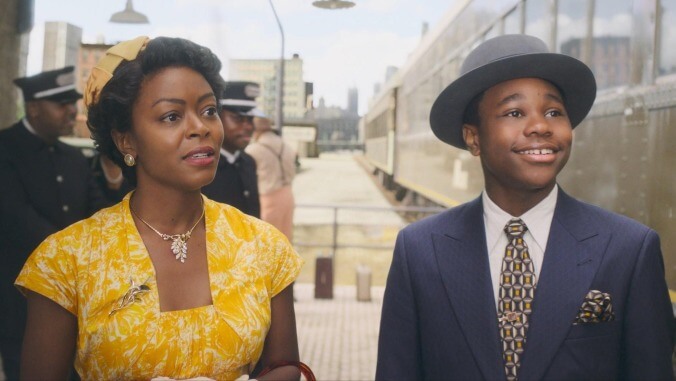In Till, Chinonye Chukwu brings to vivid life a tragic chapter in American history
Featuring Danielle Deadwyler in a mesmerizing performance, Chinonye Chukwu's follow-up to Clemency examines Emmett Till's death—and life—with power and urgency

Emmett Till was kidnapped, tortured, and lynched in Mississippi in 1955 because he whistled at a white woman. This is history—a story that every Black American knows all too well. In the new film Till, that black mark in American history is told best in a grave and concise moment that shows his mother, Mamie Till Mobley, standing over his mutilated body and declaring “My son’s body returned to me reeking of racial hatred.” It’s a moment registered in books and magazine covers, and it’s exactly what audiences need to see and hear in a movie that tells this story.
Director Chinonye Chukwu made a name for herself with the incisive and precise Clemency (2019). Here she takes on the enormous task of dramatizing the events of the murder of Emmett Till and its aftermath, perhaps an impossible one, but she handles it with aplomb. The film starts with Chicago native Till (Jalyn Hall) as he prepares to leave for Mississippi to visit his cousins. His mother Mamie Till Mobley (Danielle Deadwyler) worries about the visit because she understands how Black people are treated in the South. “Be small there,” is her advice to him. We know what happens next. The film does not show the lynching—not a spoiler since it’s outlined in the marketing and a director’s statement—but rather what happened before and after.
Chukwu has shown a great knack for collaboration with actors and drawing marvelous performances out of them (see Alfre Woodard and Aldis Hodge’s staggering work in Clemency). She evidences it again with Deadwyler in Till. Centering the film on Mamie is the right decision, and Deadwyler absolutely delivers—she’s heartbreaking from literally her first moment on screen, able to demonstrate not just a mother’s love but also her resilience. Wherever Chukwu places her camera, Deadwyler’s face makes us understand not just what Mamie is going through but rather the reality of what this country does to its Black citizens. It’s a performance of quiet strength and loud emotion, though Deadwyler is never loud or histrionic. She just simmers with profound pain.
Whoopi Goldberg as Alma Carthan, Mamie’s mother and Emmet’s grandmother, is a casting coup. As expected, she brings gravitas and warmth to the brief role. However, what makes this particularly meaningful is that we all know and love Whoopi, who most audiences have known for most of their lives—whether because of Celie in The Color Purple (1985) or being on TV every day in our homes. She’s familiar to us. She’s family. And because of that, seeing her as Emmet Till’s family makes this story more urgent, more personal. It happened in our family. Therein lies the strength of this film.
